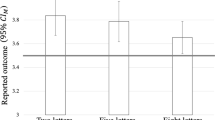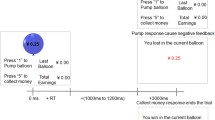Abstract
Responsibility is a necessary prerequisite in the experience of regret. The present fMRI study investigated the modulation of responsibility on the neural correlates of regret during a sequential risk-taking task. Participants were asked to open a series of boxes consecutively and decided when to stop. Each box contained a reward, except for one containing a devil to zero participant’s gain in the trial. Once participants stopped, both collected gains and missed chances were revealed. We manipulated responsibility by setting two different contexts. In the Self (high responsibility) context, participants opened boxes and decided when to stop by themselves. In the Computer (low responsibility) context, a computer program opened boxes and decided when to stop for participants. Before each trial, participants were required to decide whether it would be a Self or a Computer context. Behaviorally, participants felt less regret (more relief) for gain outcome and more regret for the loss outcome in the high-responsibility context than low responsibility context. At the neural level, when experiencing a gain, high-responsibility trials were characterized by stronger activation in mPFC, pgACC, mOFC, and striatum with decreasing number of missed chances relative to low responsibility trials. When experiencing a loss, low responsibility trials were associated with stronger activation in dACC and bilateral insula than high-responsibility trials. Conversely, during a loss, high-responsibility trials showed more striatum activity than low responsibility trials. These results highlighted the sensitivity of the frontal region, striatum, and insula to changes in level of responsibility.





Similar content being viewed by others
References
Apicella P, Ljungberg T, Scarnati E, Schultz W (1991) Responses to reward in monkey dorsal and ventral striatum. Exp Brain Res 85:491–500
Ashburner J, Friston KJ (2005) Unified segmentation. Neuroimage 26:839–851
Bell DE (1982) Regret in decision making under uncertainty. Oper Res 30:961–981
Boles TL, Messick DM (1995) A reverse outcome bias: the influence of multiple reference points on the evaluation of outcomes and decisions. Organ Behav Hum Decis Process 61:262–275
Brassen S, Gamer M, Peters J, Gluth S, Christian Büchel (2012) Don’t look back in anger! Responsiveness to missed chances in successful and nonsuccessful aging. Science 336:1217516
Büchel C, Brassen S, Yacubian J, Kalisch R, Sommer T (2011) Ventral striatal signal changes represent missed opportunities and predict future choice. Neuroimage 57:1124–1130
Camille N, Pironti VA, Dodds CM, Aitken MR, Robbins TW, Clark L (2010) Striatal sensitivity to personal responsibility in a regret-based decision-making task. Cognit Affect Behav Neurosci 10:460–469
Chandrasekhar PVS, Capra CM, Moore S, Noussair C, Berns GS (2008) Neurobiological regret and rejoice functions for aversive outcomes. Neuroimage 39:1472–1484
Chang LJ, Sanfey AG (2013) Great expectations: neural computations underlying the use of social norms in decision-making. Soc Cognit Affect Neurosci 8:277–284
Civai C, Crescentini C, Rustichini A, Rumiati RI (2012) Equality versus self-interest in the brain: differential roles of anterior insula and medial prefrontal cortex. Neuroimage 62:102–112
Connolly T, Zeelenberg M (2002) Regret in decision making. Curr Dir Psychol Sci 11(215):212–216
Connolly T, Ordóñez LD, Coughlan R (1997) Regret and responsibility in the evaluation of decision outcomes. Organ Behav Hum Decis Process 70:73–85 (As the access to this document is restricted, you may want to look for a different version under “Related research” (further below) orfor a different version of it)
Coricelli G, Aldo Rustichini (2010) Counterfactual thinking and emotions: regret and envy learning. Philos Trans R Soc Lond B Biol Sci 365:241–247
Coricelli G, Critchley HD, Joffily M, O’Doherty JP, Sirigu A, Dolan RJ (2005) Regret and its avoidance: a neuroimaging study of choice behavior. Nat Neurosci 8:1255–1262
Güroğlu B, Van dBW, Rombouts SA, Crone EA (2010) Unfair? It depends: neural correlates of fairness in social context. Soc Cognit Affect Neurosci 5:414–423
Guttentag R, Ferrell J (2004) Reality compared with its alternatives: age differences in judgments of regret and relief. Dev Psychol 40:764–775
Haber SN, Knutson B (2010) The reward circuit: linking primate anatomy and human imaging. Neuropsychopharmacology 35:4–26
Humphreys GW, Sui J (2016) Attentional control and the self: The Self-Attention Network (SAN). Front Psychol 6:1726
Izuma K, Saito DN, Sadato N (2008) Processing of social and monetary rewards in the human striatum. Neuron 58:284–294
Kelsey D, Schepanski A (1991) Regret and disappointment in taxpayer reporting decisions: an experimental study. J Behav Decis Making 4:33–53
Liu Z, Li L, Zheng L, Hu Z, Roberts ID, Guo X, Yang G (2016) The neural basis of regret and relief during a sequential risk-taking task. Neuroscience 327:136–145
Liu Z, Li L, Zheng L, Xu M, Zhou FA, Guo X (2017) Attentional deployment impacts neural response to regret. Sci Rep 7:41374
Mandel DR (2003) Counterfactuals, emotion, and context. Cognit Emot 17:139–159
Markman KD, Gavanski I, Sherman SJ, McMullen MN (1993) The mental simulation of better and worse possible worlds. J Exp Soc Psychol 29:87–109
Mellers B (2000) Choice and the relative pleasure of consequences. Psychol Bull 126:910–924
Nicolle A, Bach DR, Frith C, Dolan RJ (2011) Amygdala involvement in self-blame regret. Soc Neurosci 6:178–189
Ordóñez LD, Connolly T (2000) Regret and responsibility: a reply to Zeelenberg et al. (1998). Org Behav Hum Decis Process 81:132–142
Roese NJ (1994) The functional basis of counterfactual thinking. J Personal Soc Psychol 66:805–818
Roese NJ (1997) Counterfactual thinking. Psychol Bull 121:133–148
Rogers RD, Ramnani N, Mackay C, Wilson JL, Jezzard P, Carter CS, Smith SM (2004) Distinct portions of anterior cingulate cortex and medial prefrontal cortex are activated by reward processing in separable phases of decision-making cognition. Biol Psychiatry 55:594–602
Seeley WW, Menon V, Schatzberg AF, Keller J, Glover GH, Kenna H, Reiss AL, Greicius MD (2007) dissociable intrinsic connectivity networks for salience processing and executive control. J Neurosci 27:2349–2356
Wu H, Luo Y, Feng C (2016) Neural signatures of social conformity: a coordinate-based activation likelihood estimation meta-analysis of functional brain imaging studies. Neurosci Biobehav Rev 71:101–111
Xiang T, Lohrenz T, Montague PR (2013) Computational substrates of norms and their violations during social exchange. J Neurosci 33:1099–1108
Zeelenberg M, Pieters R (1999) Comparing service delivery to what might have been behavioral responses to regret and disappointment. J Serv Res 2:86–97
Zeelenberg M, Van Dijk WW, Manstead AS (1998) Reconsidering the relation between regret and responsibility. Org Behav Hum Decis Process 74:254–272
Acknowledgements
This work was supported by the National Natural Science Foundation of China [31271090; 71371180]; the National Education Research Project of China [CBA160186]; and the Key Program of the National Social Science Foundation of China [14AZD106].
Author information
Authors and Affiliations
Corresponding author
Ethics declarations
Conflict of interest
The authors declare that they have no conflict of interest.
Electronic supplementary material
Below is the link to the electronic supplementary material.
Rights and permissions
About this article
Cite this article
Li, L., Liu, Z., Niu, H. et al. Responsibility modulates the neural correlates of regret during the sequential risk-taking task. Exp Brain Res 236, 679–689 (2018). https://doi.org/10.1007/s00221-017-5165-3
Received:
Accepted:
Published:
Issue Date:
DOI: https://doi.org/10.1007/s00221-017-5165-3




